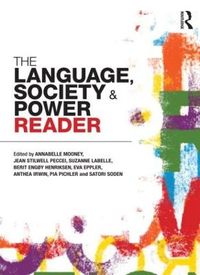
1 säljare
Language, Society and Power Upplaga 3
Language, Society and Power is the essential introductory text for students studying language in a variety of social contexts.
This book examines the ways in which language functions, how it influences thought and how it varies according to age, ethnicity, class and gender. It seeks to answer such questions as: How can a language reflect the status of children and older people? Do men and women talk differently? How can our use of language mark our ethnic identity? It also looks at language use in politics and the media and investigates how language affects and constructs our identities, exploring notions of correctness and attitudes towards language use.
This third edition of this bestselling book has been completely revised to include recent developments in theory and research and offers the following features:
a range of new and engaging international examples drawn from everyday life: beauty advertisements, conversation transcripts, newspaper headlines reporting on asylum seekers, language themed cartoons, and excerpts from the television programme South Park and satirical news website The Onionnew activities designed to give students a real understanding of the topic a new chapter covering 'Student Projects' – giving readers suggestions on how to further explore the topics covered in the bookupdated and expanded further reading sections for each chapter and a glossary. While it can be used as a stand-alone text, this edition of Language, Society and Power has also been fully cross-referenced with the new companion title: The Language, Society and Power Reader. Together these books provide the complete resource for students of English language and linguistics, media, communication, cultural studies, sociology and psychology.
Upplaga: 3e upplagan
Utgiven: 2010
ISBN: 9780415576598
Förlag: Routledge
Format: Häftad
Språk: Engelska
Sidor: 262 st
Language, Society and Power is the essential introductory text for students studying language in a variety of social contexts.
This book examines the ways in which language functions, how it influences thought and how it varies according to age, ethnicity, class and gender. It seeks to answer such questions as: How can a language reflect the status of children and older people? Do men and women talk differently? How can our use of language mark our ethnic identity? It also looks at language use in politics and the media and investigates how language affects and constructs our identities, exploring notions of correctness and attitudes towards language use.
This third edition of this bestselling book has been completely revised to include recent developments in theory and research and offers the following features:
a range of new and engaging international examples drawn from everyday life: beauty advertisements, conversation transcripts, newspaper headlines reporting on asylum seekers, language themed cartoons, and excerpts from the television programme South Park and satirical news website The Onionnew activities designed to give students a real understanding of the topic a new chapter covering 'Student Projects' – giving readers suggestions on how to further explore the topics covered in the bookupdated and expanded further reading sections for each chapter and a glossary. While it can be used as a stand-alone text, this edition of Language, Society and Power has also been fully cross-referenced with the new companion title: The Language, Society and Power Reader. Together these books provide the complete resource for students of English language and linguistics, media, communication, cultural studies, sociology and psychology.
Begagnad bok
239 kr
Fri frakt & skickas inom 1-3 vardagar
Köpskydd med Studentapan
Varje köp täcks av Studentapans köpskydd som säkerställer att boken kommer fram, att du får rätt bok och att skicket stämmer överens med beskrivning.



